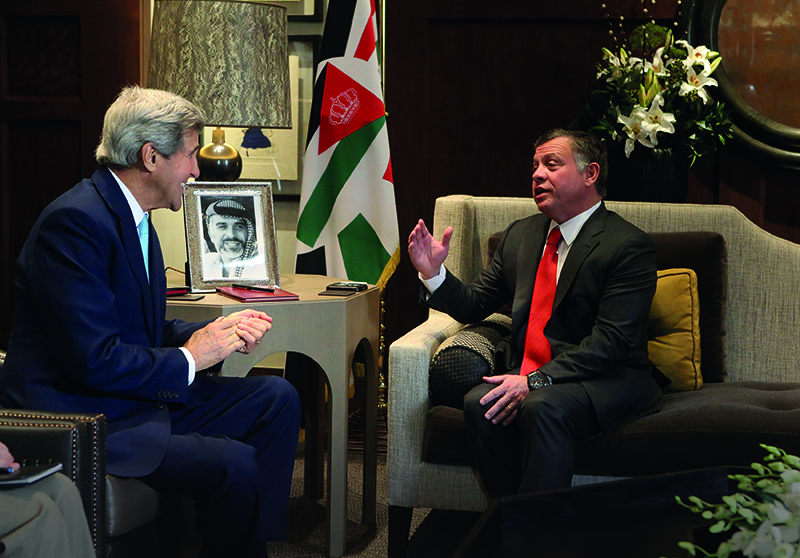The U.S. is assisting Jordan in its vision to develop thriving tourism, hi-tech, and SME sectors and was a strong supporter of the kingdom’s historic accession to the U.N. Security Council in 2014

Diplomatic relations between Jordan and the U.S. were established on January 31, 1949. Three years later, Point IV of President Truman’s foreign policy came into being, paving the way for the Jordan-U.S. partnership for economic development. When USAID evolved in the 1960s, this partnership grew exponentially and today USAID projects in Jordan represent the largest per-capita U.S. assistance program in the world.
During the 1990s, economic interdependence blossomed as ties between the two nations were wrought tighter, leading in to the Jordan-U.S. Bilateral Investment Treaty in 1997, and eventually to the 1999 Free Trade Agreement (FTA) – the first the U.S. signed with a Middle Eastern nation. Since then, King Abdullah II’s wide-ranging economic and political reform program has bolstered Jordan’s position as the United States’ key ally in the region, with shared foreign policy agenda and intertwined economic interests.
Due to its geo-political location and moderate stance in the region – Jordan recognizes Israel and retains a key role in advancing the two-state solution – U.S. military and financial aid has never been lacking; the U.S. has long viewed the kingdom as the natural peace-broker in the region. Jordan administered the West Bank until the 1967 Six-Day War, and last year announced its involvement in an initiative to form a proposed three-nation economic federation with Israel and Palestine, a topic that was first mooted during peace talks chaired by U.S. Secretary of State John Kerry.
Jordan has also played an active role in training and equipping Syrian anti-government forces and Iraqi counter-terrorism troops. In January 2014, the kingdom began a two-year term as a non-permanent member of the UN Security Council.
“Our multifaceted partnership with the Hashemite Kingdom aims to demonstrate to the people of Jordan and the region the benefits of choosing their path of moderation, of political and economic reform, of peace with one’s neighbors,” says Alice Wells, U.S. Ambassador to Jordan.
As the civil war in Syria escalated, King Abdullah was the first regional leader to call for Syrian President Bashar al-Assad to step down. Jordan has played an important role in sheltering refugees from the conflict. The UN estimates that this influx of Syrian immigrants cost the Jordanian state coffers $3.2 billion in 2014.
Historically, Jordan has acted as a haven for those fleeing conflict, and currently hosts 2 million Palestinians, according to UNWRA figures, more than any other country. Jordan has provided the vast majority of these refugees with full citizenship, as well as funding 173 schools and 23 primary health care centers.
“Jordan’s relationship with the U.S. is truly a special one, which I always take great care to remind people goes beyond friendship. It is a true partnership. The shared common interests that we have and the common challenges that we face have molded a relationship that is more than 60 years old and continues to grow stronger by the day,” says Minister of Foreign Affairs Nasser Judeh.
Some $12 billion of foregin direct investment (FDI) in Jordan has come from the U.S., a direct result of the FTA, under which there are several understandings including an open-skies civil aviation agreement, a bilateral investment treaty, a science and technology cooperation agreement, and a memorandum of understanding on nuclear energy cooperation.
“I think the FTA has done wonders for both our economies. But even taking that into account, it’s still not utilized to its maximum potential,” says Mohammed Bataineh, Chairman of the American Chamber of Commerce in Jordan. “Although the FTA has increased the volume of bilateral trade 600-fold, it’s actually raised from somewhere in the neighborhood of $330 million to over $2 billion in volume and is responsible for about 60–70,000 jobs. But, we feel that the potential is still there and it is much bigger than that.”
Total U.S. exports to Jordan are forecast at $3.2 billion in 2015, while Jordan’s exports to the U.S. are expected to reach $3.6 billion by the end of the decade. Meanwhile, USAID has been active in providing development assistance in infrastructure, public health, water supply, education, agriculture and assistance with refugee placement. Under the Millennium Challenge Program, notes Mr. Bataineh, USAID has “put around $270-280 million into the water sector alone.”
In 2008 the U.S. and Jordan signed a non-binding memorandum of understanding, which was renewed in 2014 alongside a loan guarantee scheme. President Obama visited Jordan in May 2013 and in February 2014 he and King Abdullah met to discuss the Syria situation, as well as diplomatic and trade ties; King Abdullah made two visits to the White House last year where the renewal of the memorandum and other issues concerning US cooperation were discussed.
In 2013 and 2014, the U.S. signed off on $2.25 billion in loan guarantees, allowing Jordan access to affordable financing from international capital markets. The U.S. has also backed the Jordan Competitiveness Program, a $45 million scheme to attract $700 million in FDI and create 40,000 jobs over the next five years.
“Jordan has received more than $13 billion in assistance since the establishment of diplomatic relations between both countries. USAID has brought significant contributions to the country’s economic development,” notes Beth Paige, Mission Director for Jordan at USAID.
0 COMMENTS